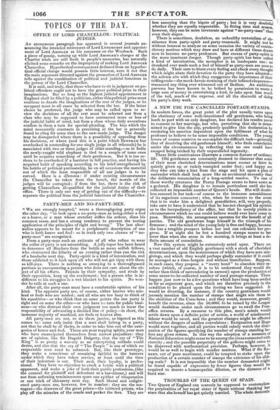PARTY-MEN AND NO-PARTY-MEN.
"WE are strongly tempted," wrote a thoroughgoing party organ the other day, "to look upon a no-party-man as being either a fool or a knave, or a man whose crotchet stifles his ardour, dims his common sense, and has a strong tendency to prevent the testing application of the principles of right and wrong." The last alter- native appears to be meant for a periphrastic description of one who is both knave and fool: so in truth only two classes of " no- party-men " are recognized. From a party-man such an estimate of all who refuse to wear the collar of party is not astonishing. A jolly toper has been heard to denounce all flinchers from the bottle as mean selfish fellows, who obstructed the hilarity of an evening rather than run the risk of a headache next day. Party-spirit is a kind of intoxication, and those addicted to it look upon all who will not get tipsy with them as kill-joys. There is nothing so annoying to a thoroughpaced partisan as encountering a person who does not care about the ob- ject of all his efforts. Friends by their sympathy, and rivals by their opposition, keep up the excitement ; but a person who is in- different to his struggles is a wet blanket to his spirits. No won- der he rails at such a one.
After all, the party-man must have a comfortable opinion of his bind. The opposite party are, of course, either knaves who mis- lead or fools who are misled ; and all who are too busy to think of his squabbles— or who think that on some points the one party is right and on some the other—or who have no turn for public busi- ness—or who distrust their own judgment too much to incur the responsibility of advocating a decided line of policy—in short, the immense majority of mankind, are fools or knaves also. All party-men are not, to do them justice, so bigoted as this comes to : some only insist that a man shall belong to a party, not that he shall be of theirs, in order to take him out of the cate- gories of knave and fool. These are your topping spirits, your men who have emancipated themselves from narrow prejudices : they are of opinion, like Sir Dugald Dalgetty, that the cry of "The King" is as pretty a war-cry as an enterprising soldado could desire, and also that the cry of "The People" is one of which no respectable man need be ashamed. But, like their prototype, they make a conscience of remaining faithful to the banners under which they have taken service, at least until the time of their indenture is out. Their zeal, their loyalty, is profes- sional. They have no objection to crack a bottle with a political opponent, and make a Joke of both their public professions, (like the counsel for plaintiff and defendant at a bar-dinner,) and will not from softening reminiscences spare one epithet of vituperation or one trick of chicanery next day. Such liberal and enlight- ened party-men are, however, few in number: they are the ma- nagers—the drawers of the great prizes—the initiated priests, who play off the miracles of the oracle and pocket the fees. They are less annoying than the bigots of party ; but it is very doubtful whether they are equally respectable. In fitting time and season, however, they can be more inveterate against "no-party-men" than even their dupes.
There is sometimes, doubtless, an unhealthy teetotalism of ab- stinence from party-spirit and party-trammels. It might not be without interest to analyze on some occasion the variety of contra. dictory motives which may draw and have at different times drawn men to become no-party professors. But excess of party-spirit is the more imminent danger. Though party-spirit has been caned
feeling and check every a kind of intoxication, the metaphor is an inadequate one : no drunkard ever made such a fool of himself as party-men are seen to do daily. Their care to blunt every thought which might abate their devotion to the party they have adopted'__ the solemn airs with which they exaggerate the importance of their trifling ends—the mock-heroic straining of their inflated eloquence— transcend any thing ever witnessed out of Bedlam. An ambitious parvenu has been known to be bribed by permission to waste a large sum of money in entertaining a lord, to take upon him much of the toil, much of the expense, and all the discredit of doing his party's dirty work.


























 Previous page
Previous page